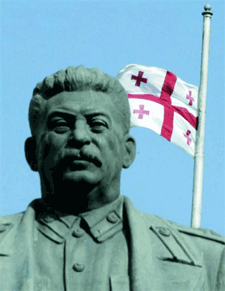European Court Recognized Rights of Repressed People on Getting Compensation from Georgian State
Ana Sheshaberidze
 According to the judgment of the Strasbourg Human Rights Court Georgia shall introduce amendments to the law which was declared to be obligatory in 1997. The case deals with the citizens who were victims of Stalin’s repressions in 1937 and in fact it is precedential. European Court passed verdict against Georgia in the case Kiladzes VS Georgia and imposed the state to pay compensation to the victimized families. It means, like the Kiladzes other repressed people can also file complaints against the state.
According to the judgment of the Strasbourg Human Rights Court Georgia shall introduce amendments to the law which was declared to be obligatory in 1997. The case deals with the citizens who were victims of Stalin’s repressions in 1937 and in fact it is precedential. European Court passed verdict against Georgia in the case Kiladzes VS Georgia and imposed the state to pay compensation to the victimized families. It means, like the Kiladzes other repressed people can also file complaints against the state.
On February 2, European Court passed verdict on the suit of Claus and Iuri Kiladzes. The family of Kiladzes was victim of repressions in the 1930s. According to the Strasbourg Court, Georgia shall pay 4-4 thousand Euros to each of them as compensation. Kiladzes were represented by two organizations at the court: Georgian Young Lawyers Association and London based Human Rights European Center.
In her interview with the Human Rights Center, Tamar Khidasheli, chairwoman of the GYLA, assessed the fact as a very important because the court imposed Georgia with the responsibility to introduce changes into the law and clarify conditions of compensations for many families like Kiladzes. Besides that, European Court called upon the government of Georgia to execute its responsibilities on time.
“In order to consider the judgment of the European Court executed, state shall not finish its activities by giving compensations only. The state shall enact a protocol on legislative level which will regulate the compensation issue of the repressed families,” said Tamar Khidasheli.
In 1997 Georgia enacted a Law on Recognizing the Victim. Article 9 of the Law stated property compensation should be estimated in accordance to the law. However, 12 years have passed and Georgia has not taken any measures to execute its obligations. There is no normative act which could regulate compensating process for repressed people.
“Article 9 of the law states that law shall regulate the property compensation. Thus, they should have enacted this law; though it was not done yet. Repressed families have been in obscure situation so far. The state had assumed responsibility and it is not executed yet. Victims appealed to Strasbourg Court for that purpose,” said Tamar Khidasheli.
Claus and Iuri Kiladzes were born in 1926 and 1928. During Soviet Union their family became victim of political repressions. Soviet Regime killed their father in 1937 and in 1938 their mother was arrested and exiled; entire property was sequestered from the family. Later, the brothers were sent initially to Tbilisi special asylum for children and then in Russia where they lived for more than two years. Afterwards, with the support of their grandmother, they returned in Georgia. Their mother was rehabilitated in 1956 and father – in 1957. On August 19, 1998 Saburtalo District Court in Tbilisi found the family victim of political oppression.
Initially, the Kiladzes appealed to Georgian courts and requested compensation based on the Law on Recognizing Victims of Political Oppressions. Despite the status of the victims, Georgian courts did not satisfy the suit of the Kiladzes – the courts clarified that Georgia had not enacted a law which could estimate the amount of compensations for victim families. After refusal, they sent suit to Strasbourg Court.
Tamar Khidasheli added that if a person, who is victim of repressions, is dead, his/her child can request compensation.



